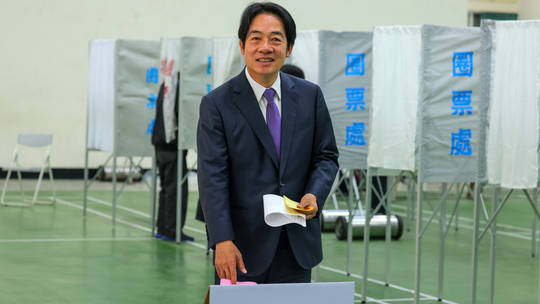Taiwan’s 'anti-China' candidate wins presidential election
13.01.2024 13:04
 Taiwan’s 'anti-China' candidate wins presidential election
Taiwan’s 'anti-China' candidate wins presidential election
Photo: Getty Images / Annabelle Chih/Getty Images
Lai, who entered the election as Taiwan’s vice president, claimed victory after the candidate representing the island’s main opposition party, Hou Yu-ih, conceded defeat.
The DPP, which was seeking a third term in power, rejects Chinese sovereignty over Taiwan and maintains that the island has the right to a separate identity from mainland China. Lai has said he is determined to preserve peace across the Taiwan Strait, but has called for boosting the self-governing territory’s defences, to ward off possible threats from Beijing.
Lai was declared the victor after partial results showed that he had gained 40.2% of the vote, prompting Hou – as well as former Taipei mayor, Ko Wen-je of the Taiwan People’s Party – to withdraw from the race. Incumbent Taiwanese President Tsai Ing-wen is constitutionally prohibited from seeking a third term in office.
“Every vote is valued, as this is Taiwan’s hard-earned democracy,” Lai said in the southern city of Tainan on Saturday before casting his vote, according to Reuters.
The Chinese government has described Lai as a separatist, and has rejected his calls for talks over Taiwan’s future. His rival, Hou, has accused Lai of supporting Taiwanese independence – while Lai claims that Hou holds pro-Beijing positions, which Hou denies.
Ko, whose Taiwan People’s Party has appealed to the island’s youth vote since it was established in 2019, has focused more on domestic issues, such as housing costs. However, while he has said he wants to re-engage with China, he has stressed that this cannot infringe on Taiwan’s own democratic goals.
Following his victory, Lai said that he is “determined to safeguard Taiwan from continuing threat and intimidation from China” and said he intends to maintain the current status quo in the Taiwan Strait. He added that his administration will “use dialogue to replace confrontation” in its diplomacy with Beijing – which had warned voters against supporting Lai.
However, Lai also said the DPP did not hold on to a majority in the Legislative Yuan, Taiwan’s unicameral parliament, where 113 seats were being contested in a separate vote. “The elections have told us that the people expect an effective government as well as strong checks and balances,” he said, adding that “we fully understand and respect these opinions from the public.”
The parliamentary balance, which could potentially hinder the new government’s ability to pass legislation, means that Taipei must form a political reality based on communication and cooperation, Lai said. He added that he would study and evaluate the policies of his defeated electoral opponents.
